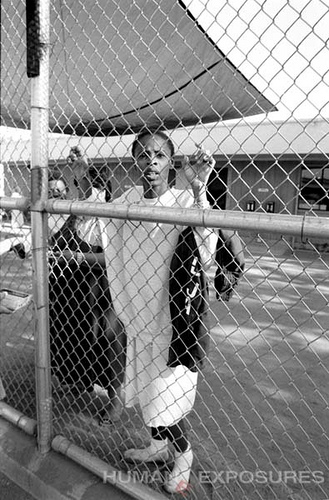 The situation of women in prison is well known to us at HUMANE EXPOSURES.
The situation of women in prison is well known to us at HUMANE EXPOSURES.
Our book, Maggots in My Sweet Potatoes: Women Doing Time, is the first in a photojournalistic series addressing the social issues of child abuse and neglect, homelessness, incarceration, and the special needs of women behind bars. It would seem that the sort of personal narratives shared in that work are shared by the women incarcerated across the Atlantic in the U.K.
Thea C. Garland, a reporter for Global Post, sheds light on the changing view of women’s incarceration that arrived with the new administration last May. The new Secretary of Justice, Kenneth Clarke, has stated that he believes there is no link between falling crime rates and rising levels of imprisonment. Evidently, he has begun a campaign against short prison sentences. In addition, Prime Minister David Cameron seems to share his views, having called short jail terms “meaningless.”
Garland brings us some startling statistics about the global extent of these issues:
Not since the mid-19th century have there been so many women in British jails. Britain’s female prison population has increased 60 percent since 1997, compared to a 28 percent increase for men.
‘Practically every country in the world, rich and poor, is seeing their social fabric disintegrate as more and more women are being charged and held in custody, often long distances from families,’ the World Health Organization noted in a report last year.
The numbers that Garland reports for the U.S. are also unsettling:
While women make up only 7 percent of inmates in state and federal prisons in the United States, according to the Bureau of Justice Statistics, between 2000 and 2008, the female prison population in America rose by 23 percent. More than half of women in federal prisons said they were mothers.
“Down under,” another former British colony is not exempt from the trend:
In Australia, the imprisonment rate for women rose by 209 percent between 1984 and 2003, but only 75 percent for men, according to the report ‘New Gender Rights for Women Prisoners and Offenders.’
In Maggots in My Sweet Potatoes: Women Doing Time, the photographs of Susan Madden Lankford are accompanied by the words and stories of women and workers in a California women’s jail. These women’s crimes are often intertwined with prior abuse, mental health problems, and addiction issues. Garland holds a British mirror up to these narratives and finds the reflection to be quite similar:
A report by a British penal reform charity, The Prison Reform Trust, revealed that a staggering 70 percent of British female prisoners had two or more mental health problems; more than a third said they had attempted suicide at some point. More than half of women in British prisons had suffered from domestic violence and one in three had been sexually abused, according to the trust.
The Howard League for Penal Reform states that women account for roughly 50% of all incidents where harm was self-inflicted, but make up only 5 % of the total prison population. With a 50% rise in incidents of this nature between 2003 and 2007, the numbers look grim.
Follow the link below to read the rest of Garland’s article — it is thoughtful and dense with information. When you’re done, stop back and let us know your thoughts.
Follow Humane Exposures Publishing on Facebook.
Source: “UK: When jail doesn’t work,” The Global Post, 08/05/10
Image copyright Susan Madden Lankford, from the book “Maggots in my Sweet Potatoes: Women Doing Time.” Used with permission.
Visit Us on Facebook: Humane Exposures Publishing , downTownUSA, Maggots in My Sweet Potatoes, It’s More Expensive To Do Nothing









